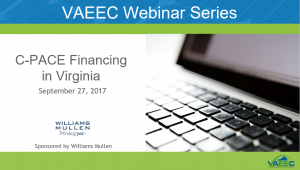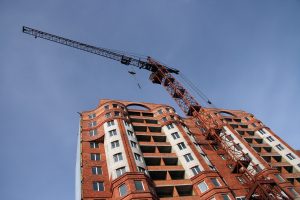Webinar Recap + Audio: C-PACE Financing in Virginia
 By now, many of you have probably heard us speak about commercial Property Assessed Clean Energy, or PACE, financing. It has become one of VAEEC’s top focuses in the past few years due to its ability to spur economic growth and revitalization while also reducing energy usage in commercial buildings. To learn more about the basics of PACE, visit our PACE webpage.
By now, many of you have probably heard us speak about commercial Property Assessed Clean Energy, or PACE, financing. It has become one of VAEEC’s top focuses in the past few years due to its ability to spur economic growth and revitalization while also reducing energy usage in commercial buildings. To learn more about the basics of PACE, visit our PACE webpage.
Recently, VAEEC held our second PACE webinar, C-PACE Financing in Virginia, back in September. Unlike our first PACE webinar, which mainly covered the basics of PACE, the main goal of this webinar was to be a resource for localities interested in developing and implementing a PACE program. The webinar provided listeners with:
- A brief overview of C-PACE, including its legality and case studies,
- Best practices when developing and implementing a program,
- The program administrator’s role,
- The benefits to localities, and
- The internal process of developing a PACE program.

PACE provides financing for energy efficiency renovations for commercial and multifamily buildings.
William Nusbaum (Williams Mullen) kicked things off with an overview of what PACE is and how it works in Virginia. He also touched on the Mid-Atlantic PACE Alliance, or MAPA, which is a partnership between Virginia, Maryland, and DC stakeholders created to accelerate PACE programs and project closings in the region.
Time and resources are by far the two most common concerns we hear from localities when talking about developing a PACE program. Scott Dicke (Sustainable Real Estate Solutions (SRS) and Arlington C-PACE) was able to address these concerns by discussing the role of the PACE program administrator. Program administrators alleviate the burdens placed on a locality when starting up and running a PACE program. They provide contractor education and support services to contractors, building owners, capital providers, and localities. Scott reinforced these points by providing case studies of programs SRS has helped launch and run.
Susan Elliott (City of Charlottesville) closed out the webinar with a local government perspective. Localities are interested in PACE because it is a tool that helps spur economic develop and revitalize existing building stock. Furthermore, Susan dove into the internal process of developing a PACE program and spoke about existing resources that help localities each step of the way.
Presentation slides and the audio recording can be accessed here. If you have any questions or if you would like additional information about PACE, please contact Jessica Greene.
A special thank you to Williams Mullen, our webinar sponsor, and our speakers.
